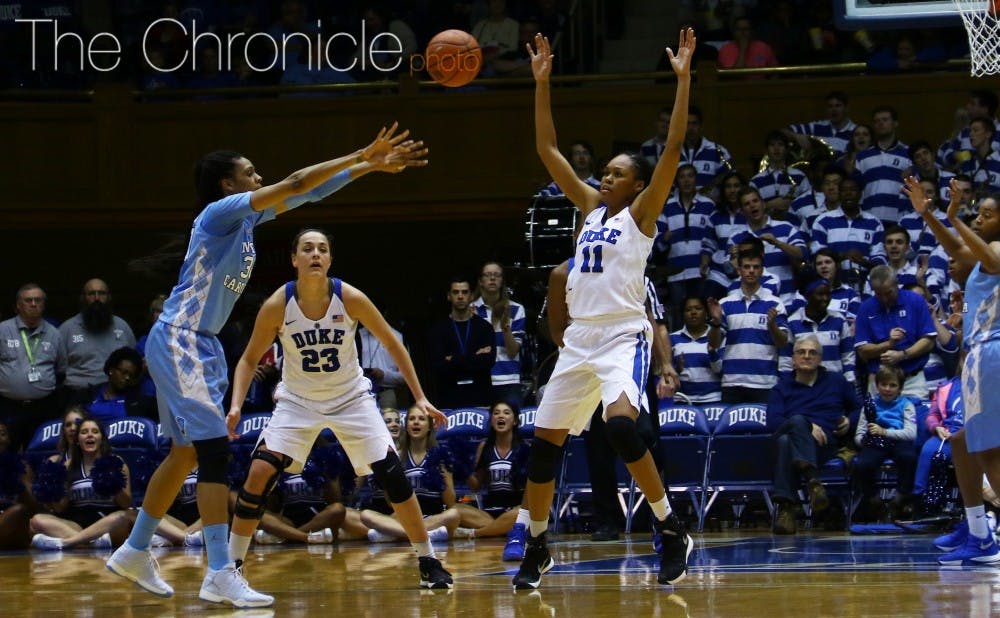Azurá Stevens proved Sunday that she can impact the game in ways other than scoring.
Playing at the top of a half-court trap that transitioned into a 3-2 zone, Stevens was a difference-maker for the Blue Devils in their 71-55 win against North Carolina, adding two blocks and numerous deflections to her 26-point, 14-rebound performance. Duke head coach Joanne P. McCallie switched up the defense prior to the game, opting for a 3-2 zone instead of her more traditional 2-3 scheme, in which Stevens usually heads the back line of defense.
The tactical shift paid off—the Tar Heels shot just 26.3 percent from the field, and committed 14 turnovers, failing to generate enough good looks to stay with the Blue Devils.
“I think length has a lot to do with [the defensive performance], and I also think [we did a good job] disrupting even some of the half-court work that our team did, trying to disrupt people getting into their flow a little bit,” McCallie said. “Using [Stevens] at the top, she has such great length and instincts and athleticism, so that’s a nice combination to try and read passing angles and take away the high post a little bit.”
The decision was made in large part due to the Blue Devils’ overwhelming size advantage, as the Tar Heels’ tallest players checked in at 6-foot-2. In contrast, Duke’s starting frontcourt—Stevens, Oderah Chidom and Amber Henson—all stand at least 6-foot-4. With Chidom, Henson and bench players Lyneé Belton and Erin Mathias manning the bottom of the defense, Stevens used her length to make life difficult on North Carolina’s backcourt.
The Tar Heels struggled mightily from 3-point range, as they made only five of their attempted 34 treys. Freshman Stephanie Watts—a 30.1 percent 3-point shooter entering the game—missed all 14 of her attempts from beyond the arc, and teammate Destinee Walker did not fare much better, making just one trey on eight tries. Stevens’ ability to contest North Carolina’s outside shots changed the dynamic of the game and allowed the rest of the Blue Devils frontcourt to grab defensive rebounds.
Henson was the biggest beneficiary of Stevens’ defensive efforts, grabbing a total of 16 rebounds, 14 of which were on the defensive end. The graduate student also chipped in with three blocks, as the Tar Heel guards were forced to drive into the heart of Duke’s zone, where Henson stepped up and altered their shots. Chidom added a career-high five steals, overplaying passes into the post as Stevens forced the Tar Heels to make ill-advised decisions.
Although North Carolina grabbed 22 offensive rebounds, a large portion of those occurred with Henson sitting on the bench in foul trouble. The Tar Heels made a fourth-quarter run that cut Duke’s lead to six points, but once the Tampa, Fla., was inserted back into the game, the Blue Devils finished on a 12-2 spurt.
Stevens’ was particularly active in the third quarter, when Duke allowed only six points—a season-low for points scored in a quarter for North Carolina. With McCallie opting to keep her starters on the court for the majority of the period, the Blue Devils limited the Tar Heels to only 11.8 percent shooting.
Leading North Carolina scorer Jamie Cherry, Walker and Watts were frustrated in that important third quarter, as the Tar Heel guards combined for 1-of-12 shooting to start the second half. Cherry—who came into the game averaging 14.6 points per contest—finished with 16 total points, but needed 14 shots to get them.
“[Stevens] was long. She covered a lot of space, so it changed what we had been doing in the past. We hadn’t seen anyone that tall at the top of any press,” Cherry said. “I think we had to adjust our passing. We couldn’t make longer passes that we normally make—we had to shorten them up.”
Despite playing at the top of the half-court press and zone, Stevens still managed to grab eight defensive rebounds. The Raleigh native sat on the bench for only four minutes, playing about six more minutes than usual while chasing Cherry and the rest of the Tar Heel backcourt around the entire game. With her deflections and tenacious defense, Stevens spearheaded a Tobacco Road rivalry victory, as Duke moved to 4-3 in the ACC.
“I think [getting deflections] just takes away passing angles,” Stevens said. “[The ball] got in the middle too much and then I just stuck out my arm and people second-guess about it, so I think when we all put our hands out, it really helps a lot just to take away inside looks.”
Get The Chronicle straight to your inbox
Signup for our weekly newsletter. Cancel at any time.

